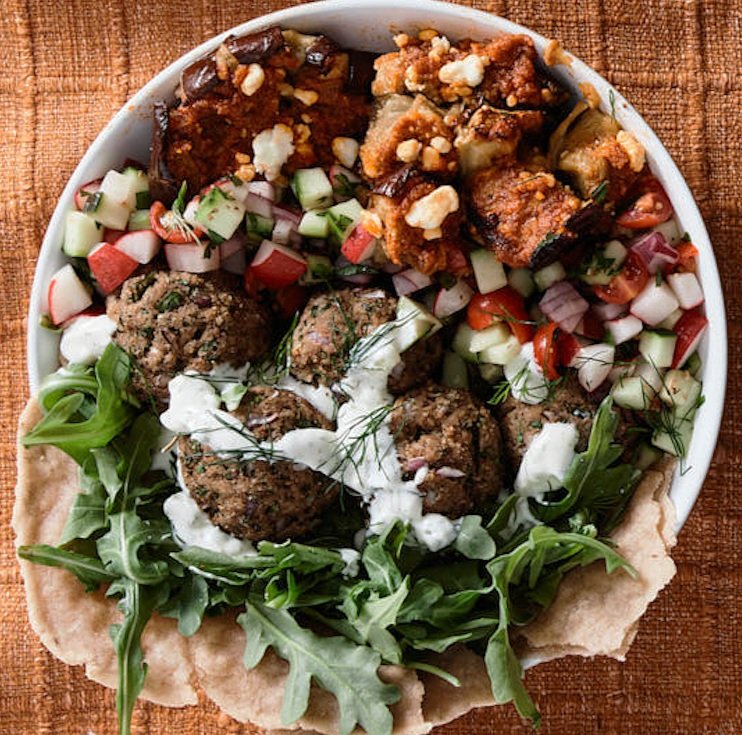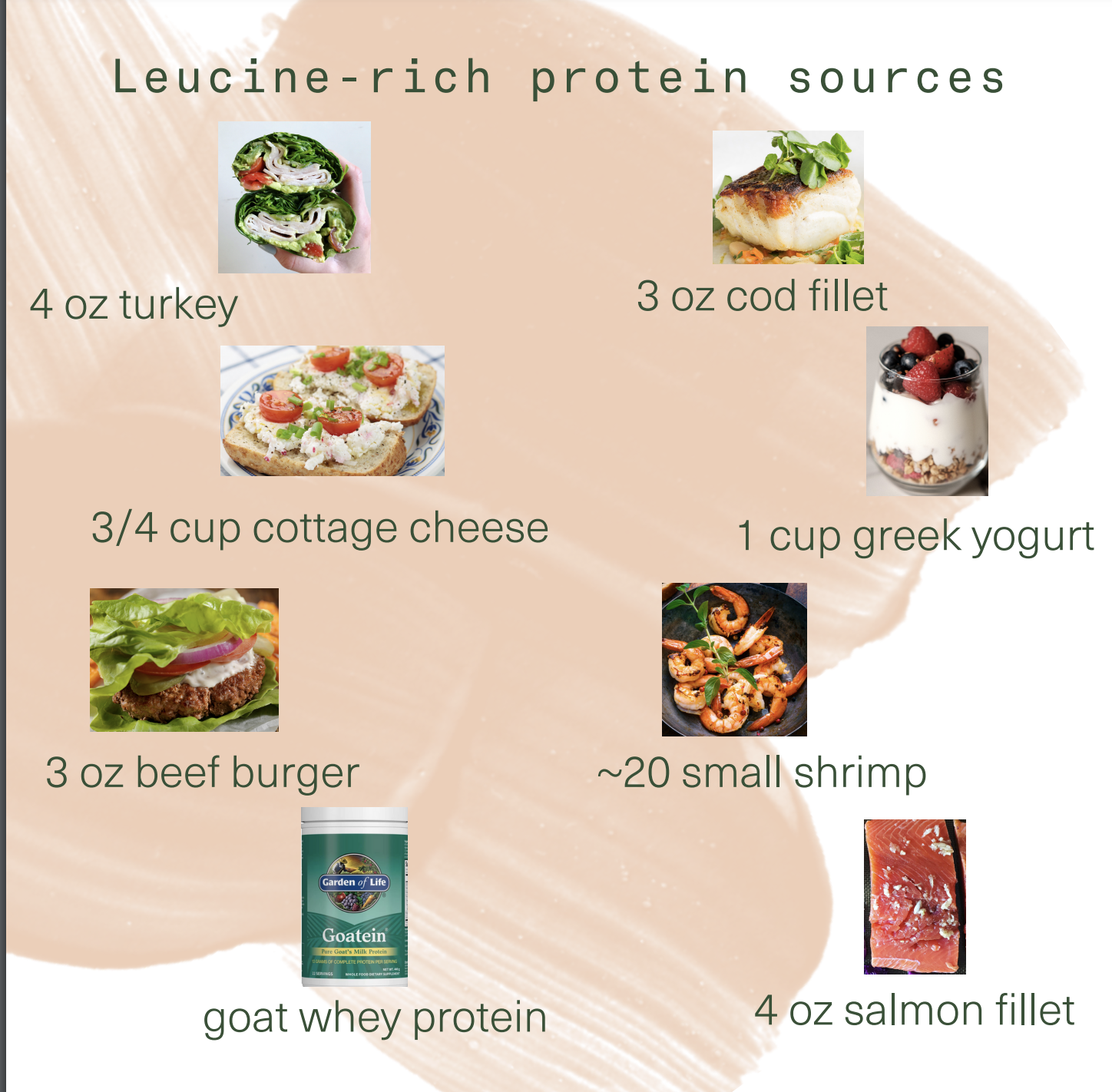Am I Eating Enough Protein?
the Macronutrient You’re likely under-consuming?
Protein.
Insufficient protein intake is a common phenomena I observe in my clients (I mainly work with women) that alone can be a game changer in helping you feel your best, most energized self!
BUT, not all proteins are created equal, here’s the latest on protein…
Why does it matter to eat sufficient protein?
Lean Body Mass Preservation - once we reach age 30, we lose muscle every year! One of the best ways we can strengthen our bodies and prevent injury as we age is eating sufficient, consistent, daily protein (in combination with strength training) (1).
In addition, sufficient protein consumption to activate muscle synthesis/preservation as we age requires 2-2.5 grams of leucine (a specific muscle-building amino acid) per meal - I have some examples of what this means below!
Immunity - without sufficient protein intake and absorption, we are unable to optimize antibody production to defend our bodies from pathogens - I see this often in clients who have a low sIgA (a gut immune marker) on their stool tests and bacterial/yeast/parasite overgrowth in the gut-oftentimes protein deficiency is a key player!
Liver detox - adequate, consistent protein intake is absolutely vital for phase 2 detoxification within the liver! You cannot ‘juice cleanse’ alone and expect to be fully supporting your body’s innate detox systems.
Blood Sugar Control - protein helps us slow down sugar (glucose from carbs) absorption into the cell, therefore keeping our blood sugar on a more stable, slow ‘rolling hills’ journey rather than an extreme rollercoaster ride. In addition, a common helpful side effect of improving protein intake that I see often in my clients = reduced sugar cravings.
Anxiety - since protein has an impact on stabilizing blood sugar, building balanced meals with carbs/fats and protein is foundational support for those with anxiety (due to the connection between anxiety and blood sugar imbalance that functional psychiatrists like Ellen Vora discuss!) Protein is also a key building block for neurotransmitter production in the body, therefore impacting things like anxiety and depression.
Tissue Healing & Repair - Proteins provide the main building blocks for tissue growth, cell renewal, and repair during wound healing. Whether you are healing from surgery, an injury, a facial peel or working on healing a damaged gut lining, protein is a building block to help you HEAL (2)!
Some Common (but not always talked about) signs that you may not be eating enough protein:
Fatigue-especially afternoon slumps!
Bloating; chronic struggle with gut issues/gut healing
Moody- highs and lows!
Difficulty healing from injuries
Poor immune system-getting sick all of the time!
Difficulty recovering from exercise
Sugar cravings
Difficulty regulating hunger and fullness cues
Common protein mistakes:
Leaving it for dinner (small/no breakfast and larger dinner with sufficient protein)
Consuming mostly plant proteins/vegetarian proteins
Assuming you can make up for ‘lost time’ at 1 meal
Relying on collagen to meet your total protein needs (it’s not a complete protein!)
Eating enough protein but struggling with absorption due to insufficient stomach acid & gut issues (we need optimal levels to digest and absorb our protein!)
Just piling up on protein-rich
foods at dinner is a common
mistake I see in my clients!
Ok, So How Much protein do I need?
A goal of 25-30 grams of total protein per meal with 2-2.5 grams of leucine at most meals for muscle building/preservation (yes, this is individualized, but this is my best general recommendation based on the current literature for women/men in adulthood).
While the current RDA recommends .8gm/kg body weight, numerous studies show that optimal intake for promoting vitality and muscle preservation is closer to .6 -.8 gm/# of body weight(4, 5). In addition, the above recommendation is based on Mark Hyman’s latest book, Young Forever; where he dives into the importance of protein as we age and how leucine-rich sources activate the MTOR (anabolic growth pathway) that supports healthy muscle synthesis and preservation.
What Are Leucine-Rich Sources of protein?
Leucine-rich sources of protein mainly come from animal-based foods. What’s more, we only absorb about 40-70% of protein coming from plant proteins (think: nuts/beans/soy) vs. 80-100% coming from animal proteins. Therefore, eating well-sourced animal foods like grass fed beef, goat or sheep dairy or wild seafood more often can be a game changer for your health-especially as we age!
Hard truth: Just collagen peptides alone or 1 egg at a meal is not a sufficient source of leucine. Pairing 2 eggs with some grass fed milk in your latte or adding collagen to your bev alongside some organic sausage at your breakfast WILL support optimal leucine intake :).
Another hard truth: You can’t just pile up on all of your protein at 1 meal, you’ll pee out the extra nitrogen and only absorb about 30 grams/sitting. You must spread it out, throughout the day!
What’s your goal?
25-30 grams of total protein/meal
& 2-2.5 grams of leucine at most meals for muscle building/preservation
Looking for more ways to optimize your foods through tips and recipe inspo?!
Make sure to get on my weekly FREE newsletter: Grounded & Nourished news here :).
References:
Copeland JL, Good J, Dogra S. Strength training is associated with better functional fitness and perceived healthy aging among physically active older adults: a cross-sectional analysis of the Canadian Longitudinal Study on Aging. Aging Clin Exp Res. 2019 Sep;31(9):1257-1263. doi: 10.1007/s40520-018-1079-6. Epub 2018 Nov 27. PMID: 30484254.
Wang X, Yu Z, Zhou S, Shen S, Chen W. The Effect of a Compound Protein on Wound Healing and Nutritional Status. Evid Based Complement Alternat Med. 2022 Mar 24;2022:4231516. doi: 10.1155/2022/4231516. PMID: 35368770; PMCID: PMC8970868.
Lonnie M, Hooker E, Brunstrom JM, Corfe BM, Green MA, Watson AW, Williams EA, Stevenson EJ, Penson S, Johnstone AM. Protein for Life: Review of Optimal Protein Intake, Sustainable Dietary Sources and the Effect on Appetite in Ageing Adults. Nutrients. 2018 Mar 16;10(3):360. doi: 10.3390/nu10030360. PMID: 29547523; PMCID: PMC5872778.
Bauer J, Biolo G, Cederholm T, Cesari M, Cruz-Jentoft AJ, Morley JE, Phillips S, Sieber C, Stehle P, Teta D, Visvanathan R, Volpi E, Boirie Y. Evidence-based recommendations for optimal dietary protein intake in older people: a position paper from the PROT-AGE Study Group. J Am Med Dir Assoc. 2013 Aug;14(8):542-59. doi: 10.1016/j.jamda.2013.05.021. Epub 2013 Jul 16. PMID: 23867520.
https://www.amazon.com/Young-Forever-Secrets-Longest-Healthiest/dp/0316453188/ref=asc_df_0316453188/?tag=hyprod-20&linkCode=df0&hvadid=598225245735&hvpos=&hvnetw=g&hvrand=7440396774323043495&hvpone=&hvptwo=&hvqmt=&hvdev=c&hvdvcmdl=&hvlocint=&hvlocphy=9028279&hvtargid=pla-1662830892688&psc=1




